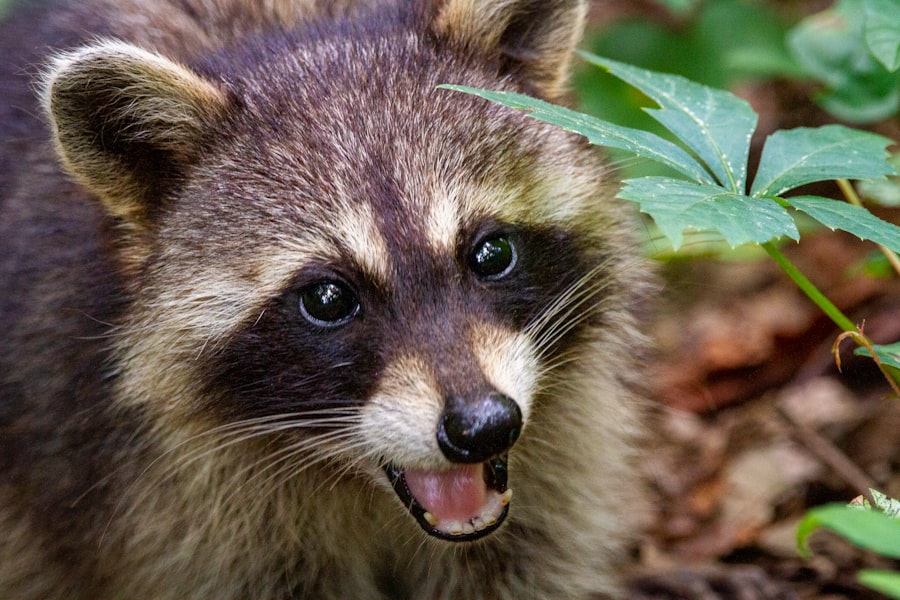Raccoons are notorious for their mischievous behavior and their ability to get into just about anything. For chicken owners, this can be a major concern, as raccoons are known to target chicken coops in search of an easy meal. It is important to take steps to protect your chickens from these crafty creatures and ensure their safety. In this article, we will discuss various methods to secure your chicken coop and keep raccoons at bay.
Key Takeaways
- Raccoons are intelligent and adaptable animals that can pose a threat to chicken coops.
- Securing the chicken coop with sturdy materials and locking mechanisms can prevent raccoons from gaining access.
- Motion-activated lights can startle raccoons and deter them from approaching the coop.
- Chicken wire fencing can provide an additional layer of protection against raccoons.
- Keeping the chicken coop clean and removing food sources can discourage raccoons from targeting the area.
Understand the Behavior of Raccoons
Before we can effectively protect our chicken coops from raccoons, it is important to understand their behavior. Raccoons are nocturnal animals, meaning they are most active during the night. They are highly intelligent and have dexterous paws that allow them to manipulate objects and open doors or latches. Raccoons are also opportunistic feeders, meaning they will take advantage of any available food source.
Raccoons are attracted to chicken coops for several reasons. First, chickens provide a readily available source of food in the form of eggs and young chicks. Raccoons are also attracted to the smell of chicken feed and will often try to gain access to the coop in search of a meal. Additionally, the warmth and shelter provided by a chicken coop can be appealing to raccoons, especially during colder months.
Secure the Chicken Coop
One of the most important steps in protecting your chicken coop from raccoons is ensuring that it is secure. This means using sturdy locks and latches on all doors and windows. Raccoons are skilled at opening doors and can easily manipulate weak or flimsy locks. Invest in high-quality locks and regularly check them for any signs of wear or damage.
It is also important to keep the coop secure at all times, even during the day when you may be tempted to leave it open for ventilation. Raccoons are opportunistic and will take advantage of any opportunity to gain access to the coop. Make it a habit to always close and lock the coop when you are not actively working in it.
Install Motion-Activated Lights
Motion-activated lights can be an effective deterrent for raccoons. Raccoons are nocturnal animals and are often startled by sudden bright lights. By installing motion-activated lights around your chicken coop, you can startle raccoons and discourage them from approaching. This is especially effective when combined with other security measures, such as secure locks and fencing.
When choosing motion-activated lights, opt for ones that have a wide range of detection and a bright output. This will ensure that any movement near the coop will trigger the lights and deter raccoons. It is also important to regularly check the lights to ensure they are functioning properly and replace any bulbs that have burned out.
Use Chicken Wire Fencing
Chicken wire fencing is an essential tool in protecting your chicken coop from raccoons. The small gaps in the wire make it difficult for raccoons to squeeze through or reach in and grab chickens or eggs. When installing chicken wire fencing, make sure it is securely attached to the ground and extends at least a foot below the surface to prevent raccoons from digging underneath.
It is also important to properly install the fencing to ensure there are no gaps or weak spots that raccoons can exploit. Regularly inspect the fencing for any signs of damage or wear and repair or replace as needed. Additionally, consider adding a top cover to the fencing to prevent raccoons from climbing over.
Keep the Chicken Coop Clean

Keeping your chicken coop clean is not only important for the health of your chickens but can also help deter raccoons. Raccoons are attracted to the smell of food and waste, so regularly cleaning out the coop can help eliminate these odors and make it less appealing to raccoons. Remove any spilled feed, clean out nesting boxes, and regularly change bedding material.
It is also important to properly dispose of any waste or spoiled food. Raccoons have a keen sense of smell and will be attracted to any food sources, even if they are rotting or spoiled. Seal waste bags tightly and dispose of them in a secure trash can away from the coop.
Use Repellents
There are various types of repellents that can be used to keep raccoons away from the chicken coop. One option is to use predator urine, such as coyote or fox urine, around the perimeter of the coop. Raccoons are naturally wary of predators and the scent of urine can deter them from approaching.
Another option is to use commercial repellents that are specifically designed to deter raccoons. These repellents often contain ingredients that raccoons find unpleasant, such as garlic or hot pepper. Follow the instructions on the product carefully and reapply as needed.
Remove Food Sources
Removing food sources is another effective way to deter raccoons from your chicken coop. Store chicken feed in secure containers that raccoons cannot access. Avoid leaving food out overnight and clean up any spilled feed or scraps immediately. Additionally, consider using hanging feeders that are difficult for raccoons to reach.
It is also important to remove any other potential food sources from your property that may attract raccoons. This includes securing trash cans with tight-fitting lids and removing fallen fruit or vegetables from your garden.
Consider Getting a Guard Dog
Having a guard dog can be an effective deterrent for raccoons and other predators. Dogs have a natural instinct to protect their territory and can help keep raccoons away from your chicken coop. Breeds such as Great Pyrenees, Anatolian Shepherds, and German Shepherds are known for their protective instincts and can make excellent guard dogs for chicken coops.
When choosing a guard dog, it is important to consider their temperament and training. Look for a dog that is comfortable around chickens and has been properly socialized. Additionally, provide the dog with proper training and supervision to ensure they understand their role in protecting the coop.
Protecting your chicken coop from raccoons is essential for the safety and well-being of your chickens. By understanding the behavior of raccoons and implementing various security measures, you can effectively deter raccoons from approaching your coop. Remember to secure the coop with sturdy locks, install motion-activated lights, use chicken wire fencing, keep the coop clean, use repellents, remove food sources, and consider getting a guard dog. By taking these steps, you can ensure that your chickens are safe from raccoon predators.
If you’re looking for the best way to keep raccoons away from your chickens, you might find this article on poultrywizard.com helpful. It provides valuable insights and practical tips on how to protect your flock from raccoon attacks. From securing your chicken coop with sturdy fencing to using motion-activated lights and sound deterrents, this article offers effective strategies to keep those pesky raccoons at bay. Check it out here for more information.
FAQs
What are raccoons?
Raccoons are medium-sized mammals native to North America. They are known for their distinctive black mask-like markings around their eyes and their ringed tails.
Why do raccoons attack chickens?
Raccoons are omnivores and will eat almost anything, including chickens. They are attracted to the smell of chickens and their eggs, making them a common predator for backyard chicken owners.
What are the signs of a raccoon attack on chickens?
Signs of a raccoon attack on chickens include missing or dead chickens, feathers scattered around the coop, and damage to the coop or fencing.
What is the best way to keep raccoons away from chickens?
The best way to keep raccoons away from chickens is to secure the coop and fencing. This can be done by using sturdy materials, such as hardware cloth, and ensuring that there are no gaps or holes that raccoons can squeeze through. Additionally, removing any potential food sources, such as spilled feed or unsecured garbage, can help deter raccoons.
Are there any natural deterrents for raccoons?
Some natural deterrents for raccoons include planting prickly plants around the coop, such as holly or rose bushes, and using predator urine or other strong scents to mask the smell of chickens.
What should I do if I suspect a raccoon is attacking my chickens?
If you suspect a raccoon is attacking your chickens, it is important to take action immediately. This may include securing the coop and fencing, setting traps, or contacting a professional wildlife removal service.
Meet Walter, the feathered-friend fanatic of Florida! Nestled in the sunshine state, Walter struts through life with his feathered companions, clucking his way to happiness. With a coop that’s fancier than a five-star hotel, he’s the Don Juan of the chicken world. When he’s not teaching his hens to do the cha-cha, you’ll find him in a heated debate with his prized rooster, Sir Clucks-a-Lot. Walter’s poultry passion is no yolk; he’s the sunny-side-up guy you never knew you needed in your flock of friends!







